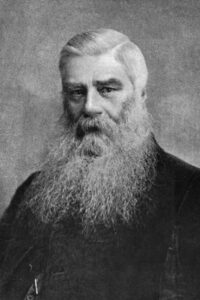
At Aboukir and Acre
Two lads were standing in one of the bastions of a fort looking over the sea. There were neither guards nor sentinels there. The guns stood on their carriages, looking clean and ready for action, but this was not the result of care and attention. It was simply because iron rusts were minor in such a dry climate. A close examination would have shown that the wooden carriages they stood on were so cracked and warped by heat that they would have fallen to pieces at the first discharge of the guns they upheld. Piles of cannonballs stood between the guns, half-covered with the drifting sand, which formed slopes halfway up the walls of the range of barracks behind and filled up the rooms on the lower floor. Behind rose the city of Alexandria, with its minarets, mosques, palaces, and low mud-built huts. Seaward lay a fleet of noble ships with their long lines of port holes, lofty masts, and their network of rigging.
“What do you think of it, Sidi?”
“It is wonderful!” his companion replied. How huge they are, what lines of cannon, what great masts, as tall and as straight as palm trees! Truly, you Franks know many things of which we in the desert are ignorant. Do you think they could batter these forts to pieces?”
The other laughed as he looked around. “One of them could do that now, Sidi, seeing that there is scarce a gun on the rampart that could be fired in return, but were all in good order, and with British artillerists, the whole fleet would stand but a poor chance against them, for while their shot would do but little injury to these solid walls, these cannon would drill the ships through and through, and if they did not sheer off, would sink them.”
“But why British artillerists, brother, why not our people?”
“Because you have no properly trained gunners. You know how strong Algiers was, yet it was attacked with success, twice by the French, twice by ourselves, and once by us and the Dutch, but it is a rule that a strongly defended fort cannot be attacked successfully by ships. If these forts were in proper condition and well manned, I don’t think that even Nelson would attack them, though he might land somewhere along the coast, attack and capture the town from the land side, and then carry the batteries. Successful as he has been at sea, he has had some experience with the difficulty of taking forts. He was beaten off at Teneriffe, and although he did succeed in getting the Danes to surrender at Copenhagen, it’s well known now that his ships got the worst of the fight and that if the Danes had held on, he must have drawn off with the loss of many of his vessels.”
Read or download Book
G. A. Henty
Biography.
George Alfred Henty (8 December 1832 – 16 November 1902) was a prolific English novelist and war correspondent. He is best known for his historical adventure stories, which were popular in the late 19th century. His works include The Dragon & The Raven (1886), For The Temple (1888), Under Drake’s Flag (1883), and In Freedom’s Cause (1885).






